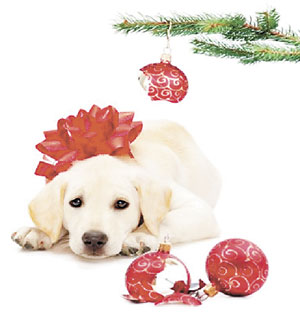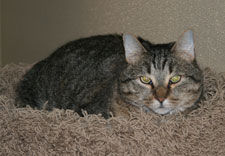
BY MELANIE HABER | NOVEMBER 22, 2011
Holiday Pet Hazards Ė Itís that time of year!
 As we are leaving Halloween territory and heading into Thanksgiving and Christmas we need to keep in mind some holiday hazards that can cause problems for our pets.
As we are leaving Halloween territory and heading into Thanksgiving and Christmas we need to keep in mind some holiday hazards that can cause problems for our pets.
Thanksgiving is a time to be thankful-but not a time for Rover to gobble up people food! Remember, fatty, spicy, salty, and frankly just about any people food can cause stomach problems. In fact, the day after Thanksgiving can be one of our busiest urgent care days as pets suffer from stomach upset; even pancreatitis. (Inflammation of the pancreas causing severe abdominal pain, diarrhea, vomiting, dehydration and in some cases death.)
But even pets that arenít allowed to have people food are at risk as Thanksgiving poses the threat of increased table scraps from our visitors. With out-of-town guests and kids running rampant, it is quite simple for our pets to grab a snack from the table or even trash. (Not to mention everyone sneaking a piece of turkey to Fido when you arenít looking.) Some pets have even been known to pull a whole turkey from the kitchen counter! Even more serious, the bones from a turkey can cause an obstruction which may ultimately lead to surgery.
Christmas brings several more dangers. Not only do the table scraps & candy pose a threat, but also the tree and itís ornaments can be hazards. Trees can be pulled over and their water toxic when consumed. Glass balls, when batted around by cats, can break and cause lacerations to the footpads. Dogs can be interested in mouthing glass ornaments thus causing cuts to the mouth with the potential for ingesting the glass and causing stomach damage. Playing with tinsel is difficult to resist for most cats and when eaten can cause blockage of the intestines. Never allow pets around a Christmas tree without adult supervision.
Decorative lights pose a problem with the extra accessible electric cords they provide. Cats and dogs alike can chew these cords causing a number of very serious conditions ranging from heart attack, to severe burn damage of the mouth, to immediate or delayed fluid build-up in the lungs. Hide electrical cords so they are inaccessible to your pets, like running the accessible portion through PVC pipe. Blinking lights can cause problems for pets predisposed to seizures.
Some holiday plants are also toxic to your pet such as holly, amaryllis, mistletoe, poinsettia & Christmas cactus.
If you are using antifreeze this winter clean any spills thoroughly and keep the bottle out of reach of pets. Itís sweet taste encourages licking which can be fatal. If traveling with your pet this year to snowy regions, make sure and clean his feet after being outdoors to remove salt and chemical residues.
And finally, make sure your pet is properly tagged or microchipped. The onset of visitors coming to and fro can lead to added excitement and a quick escape through the constantly open door.
Remember, it is always easier to prevent a disaster than to react to one. Keep danger out of your petís reach. If your pet does require medical attention this holiday season remember we are a fully equipped pet urgent and critical care center and we are here for you 24 hours a day, 7 days a week! Open all holidays and weekends. 480-488-6181.
NOVEMBER 22, 2011
Holiday Pet Festival will be helping hundreds of homeless animals find forever homes in time for the holidays.
SCOTTSDALE – Arizona’s largest holiday pet and pet product festival, the Holiday Pet Festival, hosted by Tranquility Trail Animal Sanctuary, returns to WestWorld of Scottsdale on December 3, 2011.
The event is recognized not only for its family-friendly entertainment, shopping and stage shows, but also for educating people about the compassionate care of companion animals and helping hundreds of homeless animals find forever homes in time the holidays.
The Holiday Pet Festival assisted in facilitating more than 100 animal adoptions at last year's event. In addition to helping hundreds of pets find forever homes for the holidays, the Holiday Pet Festival is also committed to helping the rescue community with exhibits such as the Silent Auction, Pet Food Drive and Animal Angel Trees where 100% of the proceeds go directly to help homeless animals.
New to this year's event will be Holiday Dachshund Dash hosted by Dachshunds Only Rescue. Proceeds from this event benefit the Dachshund Only Rescue. In addition, Blazin' K9s will be presenting Flyball demonstrations. Flyball races match two teams of four dogs each, racing side-by-side over a 51 foot long course. Each dog must run in relay fashion down the jumps, trigger a flyball box, releasing the ball, retrieve the ball, and return over the jumps.
Also featured at the Holiday Pet Festival this year is the PetSmart Rescue Animal Fashion Show. The Fashion Show will feature an array of rescue animals, available for adoption, strutting their stuff down the catwalk. If a family in the audience decides to adopt one of the rescue models the lucky model will go home in their new duds donated by PetSmart, the Title Sponsor of the Holiday Pet Festival.
"Tranquility Trail Animal Sanctuary is committed to helping companion animals live happier lives, which is why animal adoption is such an important part of the Holiday Pet Festival," said Kelly Ames, Executive Director of Tranquility Trail Animal Sanctuary. "Last year this wildly successful inaugural event attracted over 7,000 attendees who enjoyed the chance to meet and mingle in a festive atmosphere. Not only was this an exciting day of interactive activities, demonstrations and product exhibitions, over 100 animals looking for their forever homes were adopted and the rescue groups raised much needed money for their causes."
Sponsors of the 2011 Holiday Pet Festival include: PetSmart, People Saving Pets empowered by PetSmart Charities & Pawlicity.
WestWorld of Scottsdale is located at 16601 North Pima Road Scottsdale, AZ 85260
Event hours are Saturday December 3rd, 10:00 a.m. to 5:00 p.m.
Admission & Parking are FREE!
For more information or to schedule an interview with a Tranquility Trail Animal Sanctuary representative, please call 480-406-7301 or email [email protected].
Tranquility Trail Animal Sanctuary is a non-profit, 501(c)3 organization dedicated to the compassionate care of companion animals. For more information about Tranquility Trail Animal Sanctuary please visit www.tranquilitytrail.org.
NOVEMBER 22, 2011
Purchasing a new horse
It may be just one horsepower, but before riding off into the sunset on a newly purchased pony, it is important to investigate the quality and health of that animal.
Dr. Michael Martin, associate professor specializing in equine primary care at the Texas A&M College of Veterinary Medicine & Biomedical Sciences, has some tips on selecting a horse and how veterinarians can help.
"There are many aspects involved when buying a horse, in addition to answering health questions," states Martin.
"The concern for a first-time buyer should, and most importantly, be the safety of the horse," says Martin. "Buy a horse that is experienced and dependable, one with a good attitude."
Martin recommends that the "attitude" judgment be made by a friend or trainer who is qualified and knowledgeable about horses.
"Veterinarians only spend a very limited amount of time with the horse evaluating its medical condition, so many veterinarians may be reluctant to make a judgment about the disposition of the horse," says Martin. In addition, veterinarians may be reluctant to make judgments about the horse’s conformation unless it relates to a lameness issue.
Martin explains that three basic medical examinations are performed by a veterinarian on any individual horse. A health certificate, insurance exam, and a pre-purchase exam provide different levels of information about the health status of a horse.
The health certificate is used to determine if a horse is free of any infectious or contagious diseases and is usually done when a horse is crossing state lines.
An insurance exam is more in-depth and focuses on satisfying the specific questions of an insurance company. The company may be more concerned with what kind of mortality risk is present with the particular horse.
The pre-purchase exam is performed to inform the prospective buyer of the medical status of the horse at the time of examination so that a more knowledgeable decision can be made.
"Find a veterinarian to perform the pre-purchase exam who is knowledgeable and familiar with the discipline in which you desire to use the horse, even if it is just trail riding," adds Martin. "Then the veterinarian can examine the horse and provide a more accurate assessment of possible medical problems."
Another important aspect of buying a horse is to become aware of the management techniques used to care for the horse.
"When buying a horse, be sure to have a plan and be knowledgeable about how the horse will be managed to include feeding and exercise programs," Martin stresses.
Ask several questions about the horse's history and specific needs.
For instance, horses usually require routine hoof care. Ask if the horse requires special shoes or if leg or hoof problems exist.
In addition, ask questions about the amount of time the horse is kept in a stall versus outside.
"Horses are managed differently as far as turnout time. Turnout time (meaning outside the stall) can make a huge difference in attitude," says Martin.
A particular problem may not have been evident prior to purchase, but because of a change in management a horse may develop an issue as a result of excess energy from confinement or a change in diet.
Horses are different concerning the amount of time they will tolerate being in a stall. Martin suggests that horses be turned out for at least three to five hours a day on days they are not ridden.
"The ideal situation is if a horse could be out 8-12 hours per day," says Martin.
Prospective buyers are often not aware of the daily requirements of caring for a horse, and are more focused on getting the most enjoyment out of the experience. Asking questions about the horse that you are thinking about purchasing, taking someone knowledgeable with you, and including a veterinarian's evaluation in the process can go a long way towards making the right decision for you and your new horse.
Pet Talk is a service of the College of Veterinary Medicine & Biomedical Sciences, Texas A&M University. Visit http://vetmed.tamu.edu/pet-talk.



